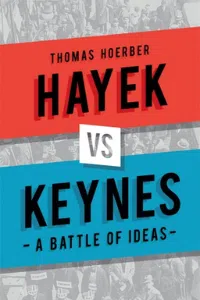
A Battle of Ideas
Since the explosion of the subprime crisis and the bankruptcy of Lehman Brothers, John Maynard Keynes’s major work, The General Theory of Employment, Interest and Money (1936), has been enthusiastically rediscovered. It has been praised with the same zeal with which ‘neoliberalism’, identified as the ideology that had led to the crisis in the first place and blamed for the apparently cold-hearted, counter-productive austerity measures imposed on entire countries by supranational bodies like the IMF or the Eurozone, has been vilified.
One of the names that inevitable crop up in discussions about liberalist thought is Friedrich Hayek, whose major work The Road to Serfdom (1944) recently appeared in the same shortlist of ‘most influential academic books of the 20th century’ as Keynes’s General Theory (the latter being ranked first).
When commentators and editorialists, from national TV pundits to world-wide celebrities like Nobel Prize winners writing columns in American newspapers, start to throw the names of major economic theories at each other, it is no doubt a good moment to get back to the basics and try to obtain a better grasp on the original texts.
In his recent comparative essay Hayek vs. Keynes – A Battle of Ideas, Thomas Hoerber does exactly this. He takes two of the most important classics of economics from the shelf and opposes the thoughts and arguments they contain in an accessible manner.
At a moment where economics seem to have become a sub-discipline of applied mathematics, here is an author who takes us by the hand, guiding us rather patiently through this battlefield of ideas, and constantly reminding us that economics can, and actually should, be a profoundly social science, providing insight into how society works and how economic measures can, and actually should, contribute to the common good.
In his compact and dense book, Thomas Hoerber manages to show that this is not an idle ivory tower debate between two schools of thought founded over 70 years ago, but a fundamental, unresolved, ideological dispute about how the economy ought to be organised and what a good society is.
And the winner is …? The current consensus seems to be Keynes. But against the backdrop of the massive discursive cycle of rehabilitation of Keynesianism, the author finds himself, throughout his book, recurrently in defence of Hayek, whose work, despite being written in Britain, remains deeply impregnated by the scepticism that is so characteristic of his native Mitteleuropa and certainly deserves to be rediscovered.
Published in March 2017 by Reaktion Books, London, 192 pages





